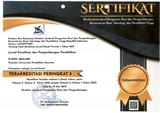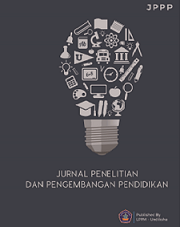The Implementation of Authentic Assessment in English Instruction
DOI:
https://doi.org/10.23887/jppp.v5i1.31723Keywords:
Perceived Knowledge, Authentic Assessment Implementation, DiscrepancieAbstract
Kurikulum 2013 menuntut guru untuk menerapkan penilaian otentik. Sekarang yang menjadi permasalahan adalah apakah guru telah menerapkan penilaian otentik dengan baik atau belum. Menanggapi situasi tersebut, penelitian deskriptif ini bertujuan untuk menganalisis penerapan penilaian otentik dalam pembelajaran bahasa Inggris di SMP. Studi ini menganalisis persepsi pengetahuan guru bahasa Inggris terhadap implementasi penilaian otentik, implementasi penilaian otentik, serta perbedaan persepsi pengetahuan guru bahasa Inggris dan praktik penilaian otentik. Penelitian ini menggunakan pendekatan peneitian kualitatif. Subjek dalam penelitian ini adalah tiga orang guru Bahasa inggris yang menerapkan penilaian otentik. Pengumpulan data dilakukan melalui kuesioner, studi dokumen, dan wawancara. Hasil penelitian menunjukkan bahwa guru bahasa Inggris telah mempersepsikan pengetahuan yang cukup terhadap pelaksanaan asesmen otentik. Persentase pengetahuan yang dipersepsikan guru adalah 64%. Guru telah menerapkan empat jenis penilaian otentik yaitu, observasi, penilaian kinerja, penilaian rekan dan diri, dan proyek. Perbedaan ditemukan dalam penerapan penilaian kinerja, penilaian diri, dan portofolio. Temuan ini mengimplikasikan bahwa guru belum secara optimal menerapkan penilaian otentik.
References
Aliningsih, Fitri, and Sofwan, Ahmad. 2015. “English Teachers’ Perceptions and Practices of Authentic Assessment.” Language Circle: Journal of Language and Literature 10(1):19–27. https://doi.org/10.15294/lc.v10i1.4154.
Anon. 2019. “Kesiapan Guru Bahasa Inggris Dalam Pengimplementasian Asesmen Diri Dalam Pembelajaran Menulis Di Sekolah Dasar.” SENADIMAS 744–52.
Brown, H.D. 2004. Language Assessment: Principles and Classroom Practices. United State of America: Pearson Education.
Dewi, N.L.P.E.S. 2014. “Beyond Test: Alternatives in Assessment.” Jurnal Bahasa Lingua Scientia 6(2):211–19.
Hidayati, Nurul. 2016. “The Authenticity of English Language Assessment For The Twelfth Graders of Smk(Vocational High School) Negeri 4 Surakarta.” Premise Journal 5(1):140–59.
Marhaeni, A.A.I.N., Artini, L. P. 2015. “Asesmen Autentik dan Pendidikan Bermakna : Implementasi Kurikulum 2013.” Jurnal Pendidikan Indonesia (April 2015):499–511. https://doi.org/10.23887/jpi-undiksha.v4i1.4889.
Marhaeni, A. A. I. N., Dantes, Nyoman and Paramartha, A.A.G.Y. 2018. “Teacher Assessment Literacy: Discrepancies in Authentic Assessment Practice in EFL Context.” International Conference on Educational Assessment and Policy 2:18–21. https://doi.org/10.26499/iceap.v2i1.90.
Menteri Pendidikan dan Kebudayaan Nomor 23. 2016. Peraturan Menteri Pendidikan dan Kebudayaan Nomor 23 Tentang Standar Penilaian Pendidikan. Jakarta, Indonesia: Menteri Pendidikan dan Kebudayaan Republik Indonesia.
Nassaji, Hossein. 2015. “Qualitative and Descriptive Research: Data Type Versus Data Analysis.” Language Teaching Research 19(2):129–32. https://doi.org/10.1177/1362168815572747.
O’Malley, J.M. and Pierce, L.V. 1996. Authentic Assessment for English Language Learners: Practical Approaches for Teachers. United State of America: Addison- Wesley Publishing Company.
Paramartha, A. A. G. Y., and Pratiwi, N.P.A. 2017. “Problematika Penerapan Asesmen Dalam Kurikulum 2013 Oleh Guru Bahasa Inggris Di SMP N 2 Singaraja.” Seminar Nasional Riset Inovatif 746–51.
Park, C. W., Gardner, M.P, and Thukral, V.K. 1988. “Self-Perceived Knowledge: Some Effects on Information Processing for a Choice Task.” The American Journal of Psychology 101(3):401. https://doi.org/10.2307/1423087.
Ratminingsih, N.M., Marhaeni, A.A.I.N., and Vigayanti, L.P.D. 2018. “Self- Assessment : The Effect on Students ’ Independence and Writing Competence.” International Journal of Instruction 11(3):277–90. doi: https://doi.org/10.12973/iji.2018.11320a.
Retnawati, H., Hadi, S., and Nugraha, A.C. 2016. “Vocational High School Teachers’ Difficulties in Implementing the Assessment in Curriculum 2013 in Yogyakarta Province of Indonesia.” International Journal of Instruction 9(1):33–48. https://doi.org/10.12973/iji.2016.914a.
Rizavega, Inggid Hana. 2018. “Authentic Assessment Based on Curriculum 2013 Carried by EFL Teacher.” Jurnal Profesi Keguruan 4(2):142–49.
Rukmini, D., and Saputri, L.A.D.E. 2017. “The Authentic Assessment to Measure Students’ English Productive Skills Based on 2013 Curriculum.” Indonesian Journal of Applied Linguistics 7(2):263–73. https://doi.org/10.17509/ijal.v7i2.8128.
Tosuncuoglu, Irfan. 2018. “Importance of Assessment in ELT.” Journal of Education and Training Studies 6(9):163. https://doi.org/10.11114/jets.v6i9.3443.
Wahyuni, L.G.E., and Pratiwi, N.P.A. 2017. “Keautentikan Asesmen Guru Dalam Konteks K13.” Seminar Nasional Riset Inovatif 2017 658–65.
Downloads
Published
How to Cite
Issue
Section
License
Authors who publish with the Jurnal Penelitian dan Pengembangan Pendidikan agree to the following terms:
- Authors retain copyright and grant the journal the right of first publication with the work simultaneously licensed under a Creative Commons Attribution License (CC BY-SA 4.0) that allows others to share the work with an acknowledgment of the work's authorship and initial publication in this journal.
- Authors are able to enter into separate, additional contractual arrangements for the non-exclusive distribution of the journal's published version of the work (e.g., post it to an institutional repository or publish it in a book), with an acknowledgment of its initial publication in this journal.
- Authors are permitted and encouraged to post their work online (e.g., in institutional repositories or on their website) prior to and during the submission process, as it can lead to productive exchanges, as well as earlier and greater citation of published work. (See The Effect of Open Access)







